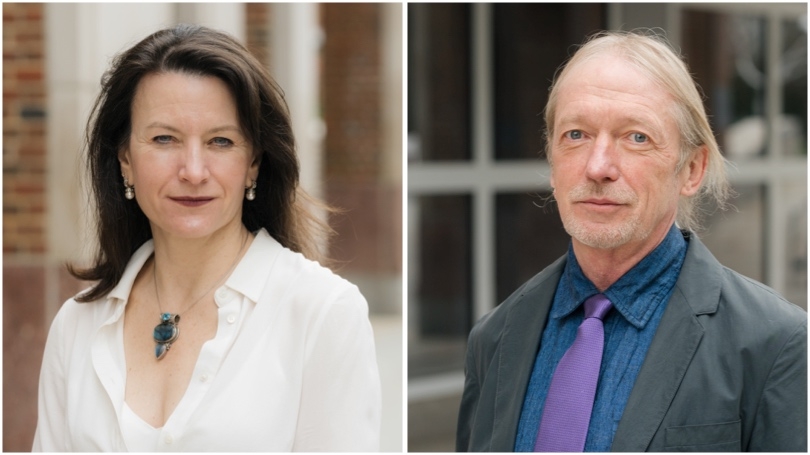
Two Professors Elected Medieval Academy of America Fellows
Posted on May 03, 2021 by Hannah Silverstein
Historians Cecilia Gaposchkin and Walter Simons have received the MAA's highest honor.
Cecilia Gaposchkin and Walter Simons—both professors in the Department of History and specialists in medieval Europe—have been elected fellows of the Medieval Academy of America, the highest honor the organization bestows on medievalists in North America.
They are among five fellows elected this year, joining a possible total of 125 North American fellows and up to 75 corresponding fellows from around the world "who have made notable lifelong contributions to the field through their teaching, scholarship, mentoring, and service," according to the academy website.
"It is rare that a class of fellows includes two from the same institution," says Lisa Fagin Davis, the executive director of the academy. "To my knowledge, this has only happened two other times in the last 20 years."
Cecilia Gaposchkin
"It's a huge honor, and it's wonderful to be elected with Walter, whom I admire so much as a colleague and a scholar," says Gaposchkin, who chairs the history department. "The Medieval Academy is the professional organization that advocates for the importance of the academic study of the Middle Ages—the organization that represents my professional identity. These are the people that I'm speaking to and writing to and my scholarship is aimed for and in dialogue with. So it's hugely meaningful to be elected as a fellow."
Gaposchkin is the author of three books, including, most recently, Invisible Weapons: Liturgy and the Making of Crusade Ideology, and a co-edited volume, The Sanctity of Louis IX: Early Lives of Saint Louis by Geoffrey of Beaulieu and William of Chartres.
Her research focuses on how religious ideas and ideology "underpin institutions of power and authority" in the High and Late Middle Ages, often focusing on liturgical sources, which, she says, have frequently been overlooked as historical documents.
"Liturgies have been comparatively ignored, in part because the assumption is that the canon of the mass is the same everywhere," she says. "But there's so much local variation if you know how to look for it."
Her current project explores liturgy and ceremony in 13th-century Paris. "I've just finished a book on the liturgical ceremonies specific to Sainte-Chapelle, built by Louis IX for the relics of the Crown of Thorns and the True Cross that he brought to Paris," Gaposchkin says, referring to relics the faithful believed to be from the time of Jesus' death.
The liturgy was turned into a mechanism of the monarchy's mythmaking. For instance, while the feast day commemorating how the Byzantine emperor Heraclius restored the cross in the 7th century was commonly celebrated throughout Europe, Gaposchkin says the Sainte-Chapelle liturgy "added to that story the story of Louis himself bringing the cross to Paris—making their king into a new Heraclius, a new hero, and incorporating Paris and the monarchy into universal sacred time. It's quite bold."
Of teaching and being a scholar at Dartmouth, she says, "It's really the ideal job. We've got an amazing group of medievalists here, across departments—a strong intellectual community. We're a leader in the field."
Walter Simons
"I study the relationship between questions of religious authority and social change," says Simons, who is currently working on a book about Elizabeth of Spaalbeek, a 13th-century mystic from the Low Countries (present-day Belgium and the Netherlands).
Simons is the author or co-author of six books, including Cities of Ladies: Beguine Communities in the Medieval Low Countries, 1200-1565; editor or co-editor of four others, including, most recently, A Cultural History of Peace in the Medieval Age; and author or co-author of more than four dozen scholarly articles.
Between 1100 and 1400, questions of religious authority "are very vital and controversial," Simons says. "I'm always emphasizing that ordinary people—working class people, the laity in general—were far more interested in questions of religion, and more broadly, had far more intellectual curiosity than we might assume. There's a tendency to think of the Middle Ages as a time dominated by kings and knights and popes and clergy. Everybody else is imagined as a kind of passive peasant population working day and night and not doing anything else. That's completely wrong."
Growing up in the medieval city of Bruges, Belgium, Simons developed an early fascination with history, and began working with medieval documents as an undergraduate.
"What I find so interesting is that a lot is still unknown," he says. "There are thousands of manuscripts that we have not properly studied. It's exciting. Even now, when I go to archives and study a manuscript, sometimes I sense that I am the first person to actually read something that somebody else wrote 600 or 700 years ago."
Simons structures his medieval history classes around issues. "I don't talk really about events—narratives about how this happened, then that happened. I'm interested in questions that people were asking and how they were trying to provide answers," he says. "If you can explain to students what the question was and why that mattered to people, they become intrigued."
Simons and Gaposchkin organize a biannual conference, the Dartmouth Medieval Colloquium, which brings medievalists from the region to campus to discuss works in progress presented by two scholars. "Cecilia is the main driving force—I'm just helping her," Simons says.
They also host Dartmouth History Institute for graduate students from other institutions—a three-day workshop on preparing dissertations for publication as books.
"That is extremely interesting because you're talking to graduate students who are absolutely primed to do this work, who are presenting new research," Simons says.
Of his election into the Medieval Academy, he says, "It's a recognition of what I've been doing for a long time—by my peers, the people who are in the profession and know my work. Especially in this time of COVID, it's good to know you're not alone and that others are reading your work. It's very meaningful."
Hannah Silverstein can be reached at hannah.silverstein@dartmouth.edu.